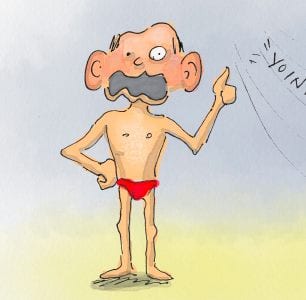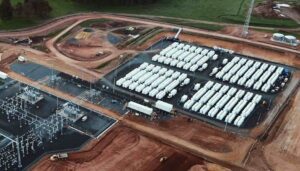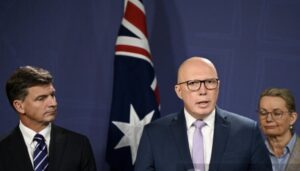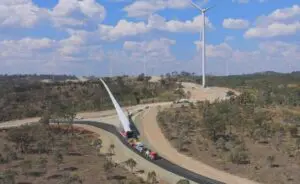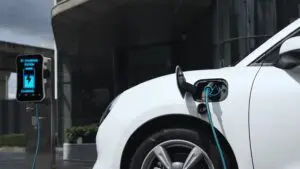Last Friday, ACT environment minister Simon Corbell stood up at the Local Energy and Micro-Grids conference in Sydney to announce that the ACT was going to accelerate its push to renewable energy, and would supply 100 per cent of its electricity needs from renewable energy by 2020, almost all of it from wind and solar.
The new target will be achieved at no added cost to the previous target of 90 per cent, and the ACT will still retain its ranking as the city with the cheapest electricity in Australia. In fact, if Canberra households embrace the energy efficiency measures on offer from the government, they will hardly see a rise in their bill at all.
Corbell told the conference, co-hosted by RenewEconomy, that not only are such targets achievable and affordable, they have to happen. “The science tells us that and the decisions at the COP (conference of the parties, or Paris climate conference) tell us that. We have to keep global temperature rises well below 2°C.”
So Corbell and his government have decided to do something about it. And that makes Corbell and his government unique in Australia. No other Australia political leader, in a position of actual power, has implemented energy and industry policies that actually fit with the science.
Yes, others, including the Greens, have equally ambitious policies. But Corbell is the only one who has dared take on the incumbents and walked the walk, as well as talking the talk. In doing so, he has single-handedly kept the large-scale renewable energy industry alive as federal policy fights brought the sector to a standstill.
The contrast between the ACT government policies with what is happening within the walls of the big building on Capital Hill at the heart of Canberra, and on the federal political landscape, could not be any more stark, or any more depressing.
Federal Labor last week trotted out more details of its own climate and clean energy policies. It seeks a 45 per cent reduction in emissions by 2030, a 50 per cent share of renewables by the same date, and plans for two separate emissions trading schemes, in a staged introduction designed to keep the cost of carbon low.
Although described as “credible”, even Labor admitted that it was the “minimum” that was required to meet the agreed Paris targets – especially given the extraordinary and unexpected developments on emissions, temperature rises, ice melt and coral bleaching being acknowledge around the world in the past week.
It might have been the least that Labor could do on the policy front, but it was as far as it was prepared to go on the political front. Any hope that its policies could present a small political shift and/or establish a basis for a return of bi-partisan support – Labor had, after all, adopted much of the Coalition’s likely policy path to meet the Paris climate targets it signed – quickly evaporated.
In a sign that Malcolm Turnbull is no longer the man most people thought he could be, and may be just a carbon copy of the man he usurped, Tony Abbott, the Coalition dusted off its scare campaigns and were joined by much of mainstream media, who accused Labor of policy and political over-reach, and of threatening Australia’s economic future.
Within 24 hours, almost the entire Coalition cabinet had managed to trot out the Abbott-era slogan of a “great big electricity tax”, and launched an attack ad against leader Bill Shorten on YouTube.
In the same week that the Coalition had trumpeted a $50 billion spend on French submarines as “economy building,” it attacked Labor’s $48 billion spend on renewables as jobs-destroying. Defence jobs good, green jobs bad.
The themes pedalled by the Coalition and the mainstream media were so similar, they could have been orchestrated: Renewables are too costly, cutting emissions will destroy the economy, Australia is leading the rest of the world, and what Australia does in any case won’t matter because it accounts for less than 2 per cent of global emissions.
Of course, the best argument against all those claims have been made by Turnbull himself, in this speech to parliament on February 8, 2010, where he skewered the very arguments he is prosecuting on behalf of the fossil fuel lobby, thanks to the dark deal he cut with the conservative rump to take over leadership of the Liberal Party.
It was the same speech where he described Direct Action as “reckless” and a fig leaf for serious action. “Australia should take action now in advance of and in order to promote a global agreement,” Turnbull said at the time. “While our emissions are only a small share of the global total, we are in per capita terms one of the highest emitters.”
That the latest attack on Labor is a demonstrably fact-free exercise didn’t bother much of mainstream media either. They were only too willing to amplify the scare campaign of the conservatives.
The Daily Telegraph, all too predictably, led the way with its much-talked about front page. It then gave the floor to the head of the coal lobby in NSW, who said the answer lay in new “clean coal” power stations. Apart from the fact that they won’t help reduce emissions, has anyone at the Tele checked out the cost of those new plants? They will be significantly more expensive than new wind or new solar.
The Australian newspaper said it would cause “great economic harm”, would cause power prices to surge and would do little to reduce missions, all for the “moral vanity of the inner-city Green-Left.” It followed up on Friday with an “exclusive” front page lead proclaiming that the ALP’s climate policy would “leave some in the dark.”
The Australian Financial Review also accused Labor of being “too ambitious”. It ignored the welcoming comments of the main business lobbies and fell in the with special interest groups and ideologues, warning against the “destabilising” impact of “unreliable” renewables, and criticising Labor for not embracing “cheaper” low emissions technologies such as “clean coal” and nuclear.
It seems that not even the lead writer of the nation’s business daily is capable of reading a basic chart on the cost of energy.
So, how did we get to this, and how to get our of it? The Coalition appears to have forgotten that it was the Party that signed the Paris agreement that aims to limit warming to between 1.5°C and 2.0°C.
Corbell says it is about dealing with the incumbents and embracing change. He, unlike others on the national stage, can see what is happening on the international stage. And the ACT, without a local coal or gas industry, can see above the policy smog of the fossil fuel industry.
“Fundamentally, the way to sum it (the national policy debate) up is incumbents don’t do disruption,” Corbell told the audience.
“Their position in this market is fundamentally threatened by this transition, so they will always assert that any shift from the status quo is a threat … to the economy.
Turnbull had said much the same thing six years ago: “All of us know in this House that industries and businesses, attended by an army of lobbyists, are particularly persuasive and all too effective at getting their sticky fingers into the taxpayer’s pocket.
“Having the government pick projects for subsidy is a recipe for fiscal recklessness on a grand scale and there will always be a temptation for projects to be selected for their political appeal.”
Corbell has shown that there is another way.
“We are looking at an energy future that is going to be supplied by wind and solar and battery storage, with 100,000 Canberra homes supported to improve energy efficiency and reduce their demand.
“These sound like big targets, but all of them – all of them – have been achieved using the existing policy measures and state and federal powers.
“We are demonstrating through these policies that not only is a transition to a renewable energy future achievable, it is affordable and it is creating jobs. The incumbents will try to protect their position, it is up to governments to push through.”

